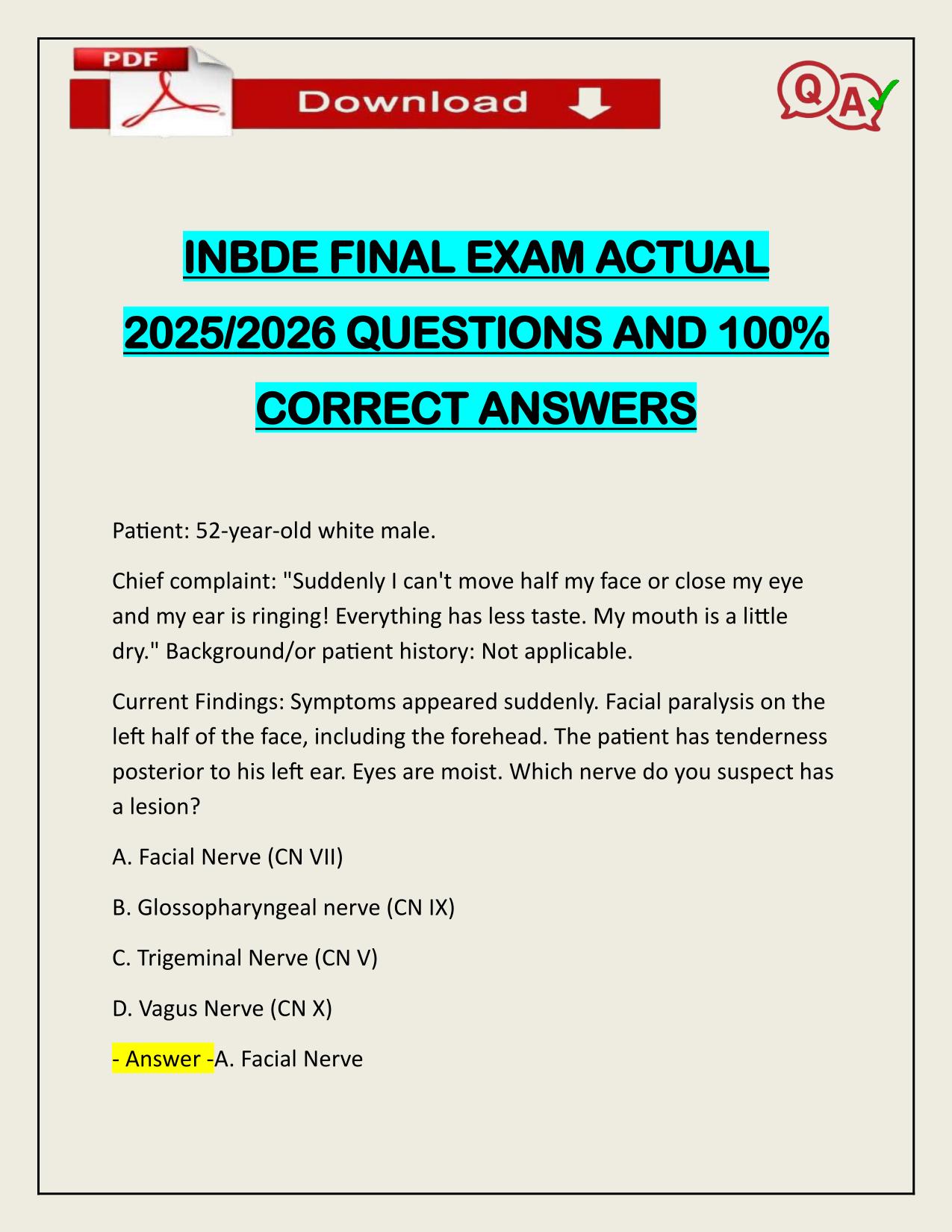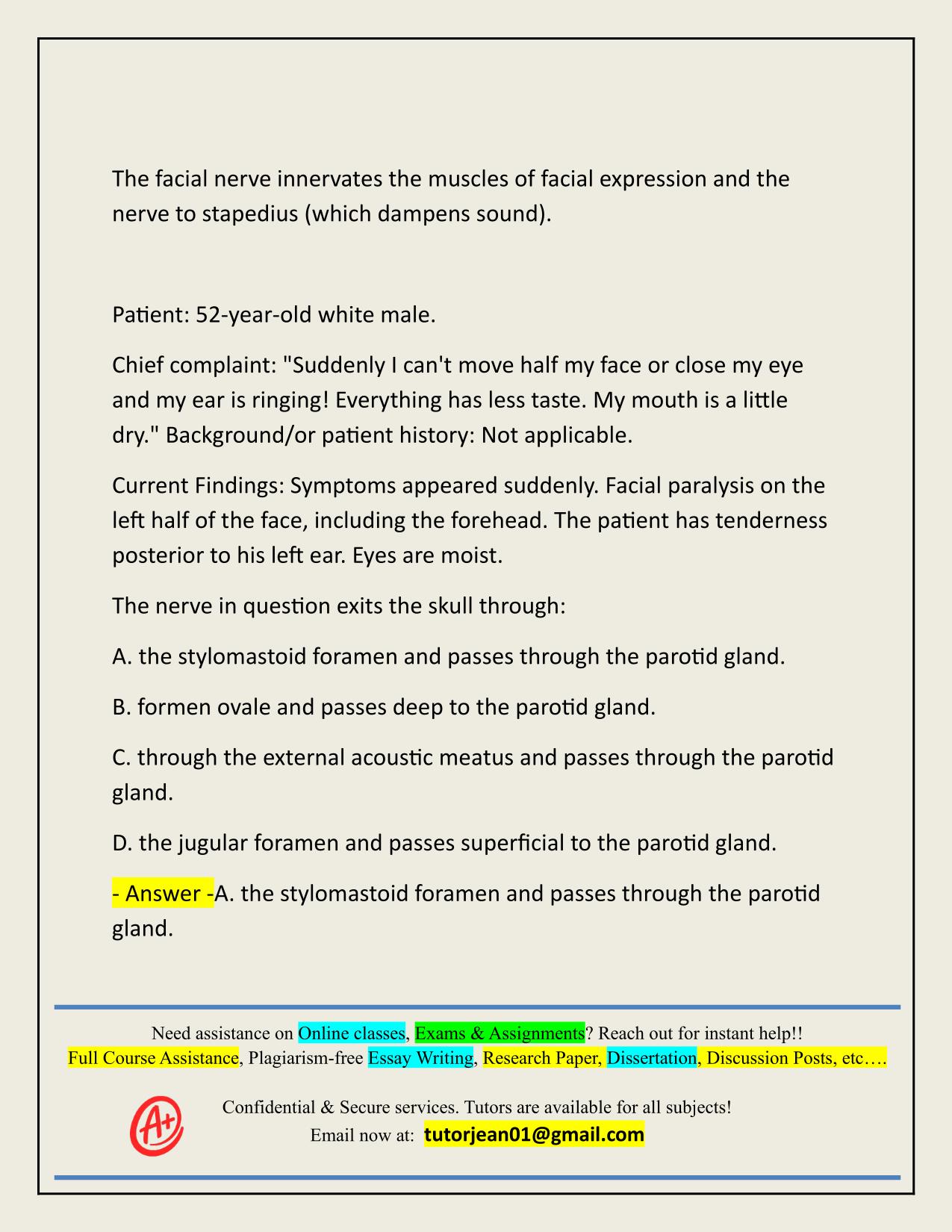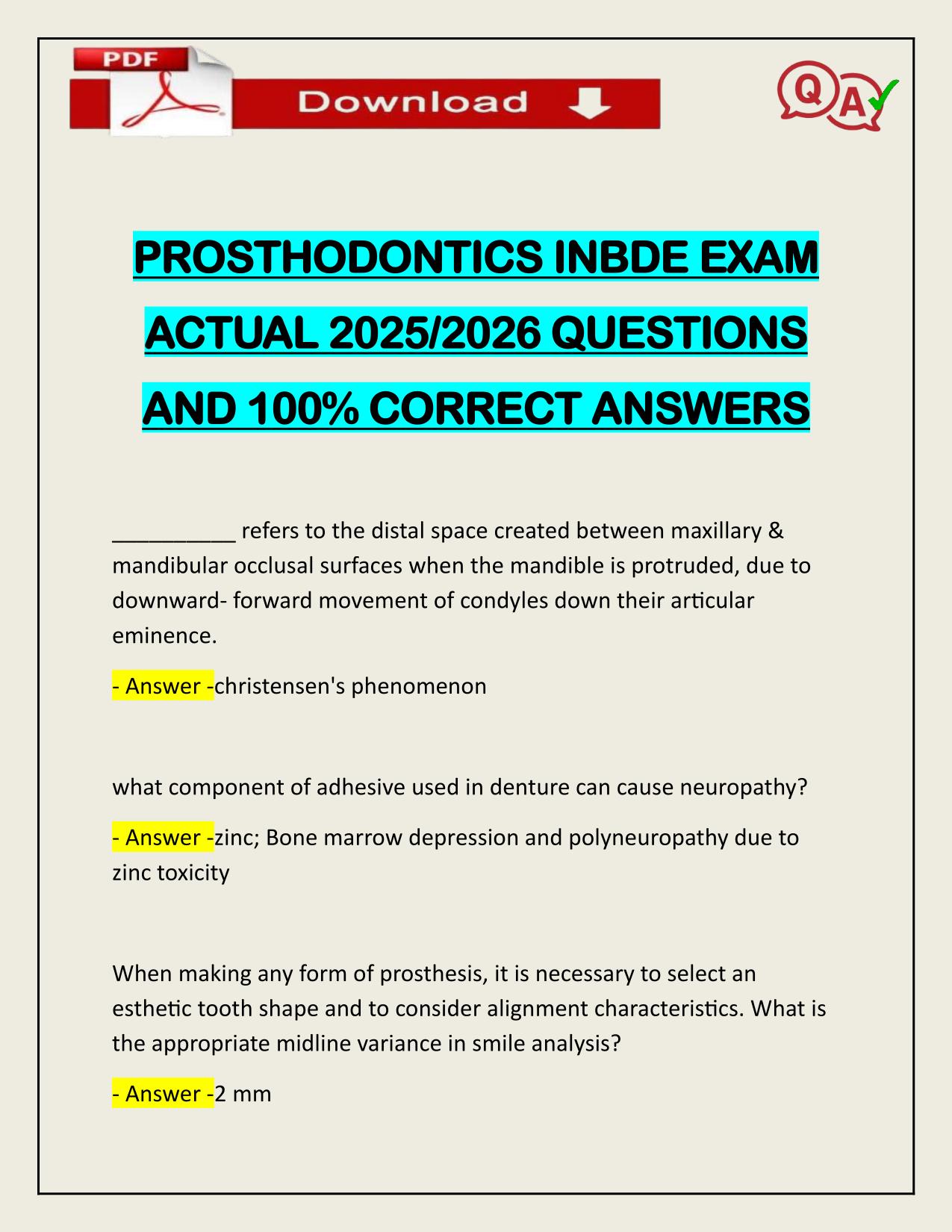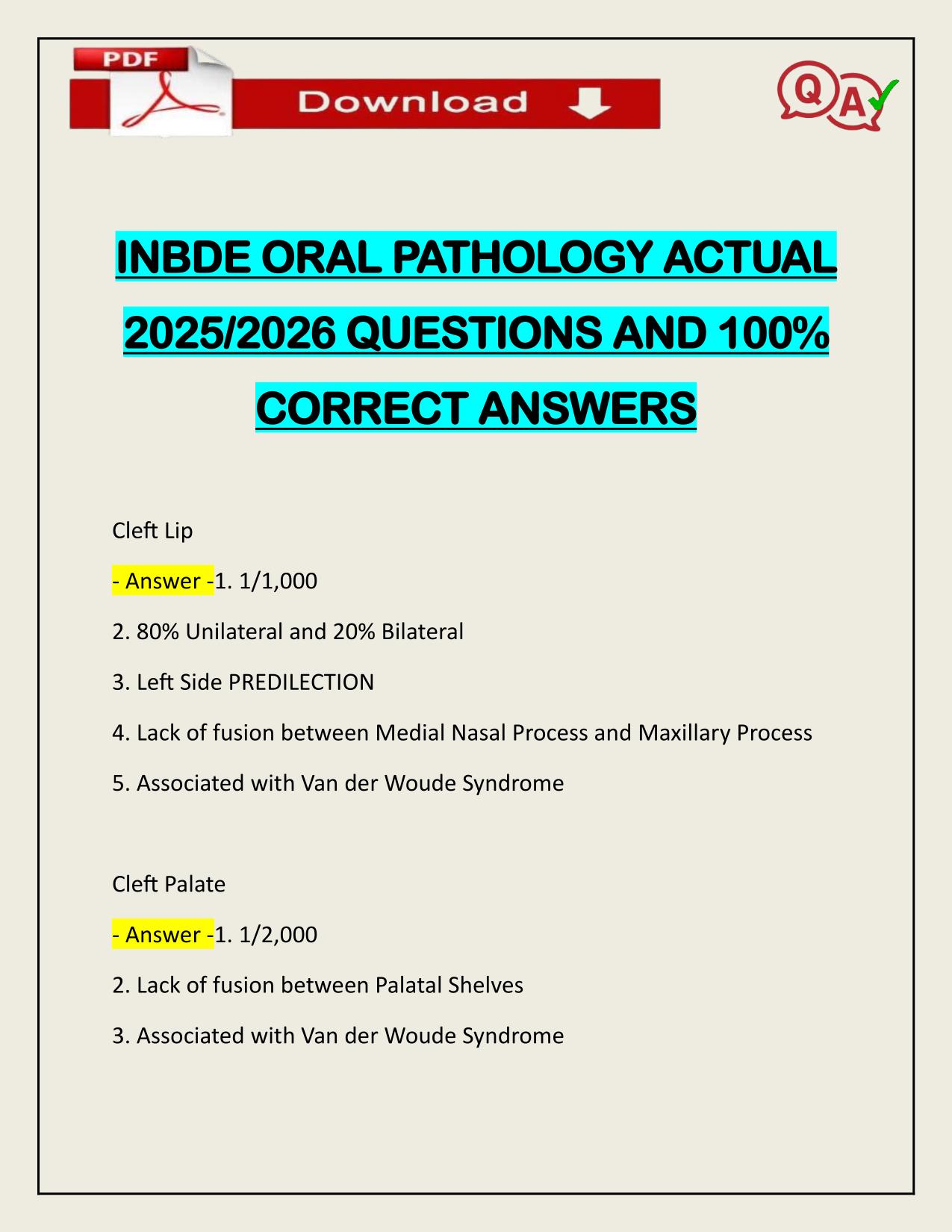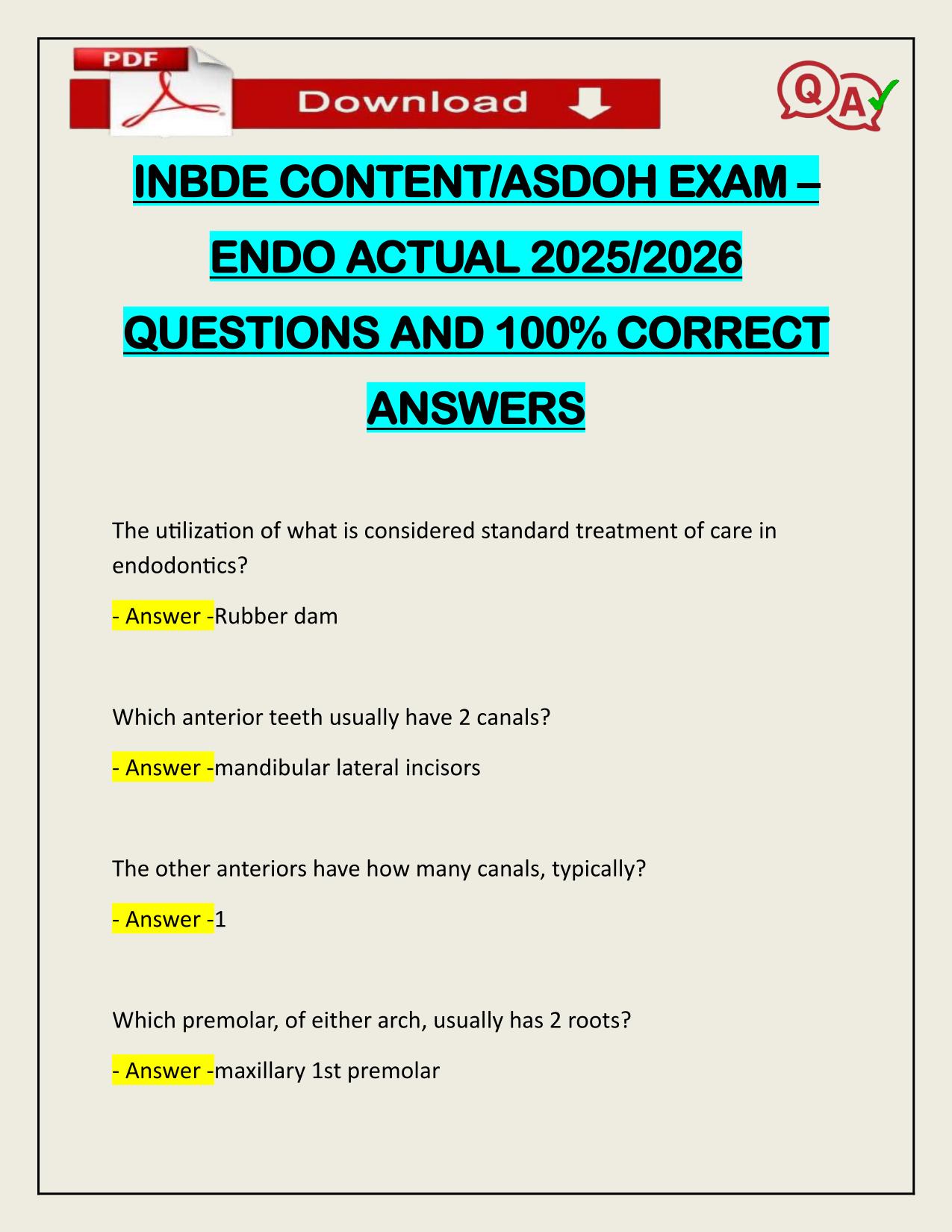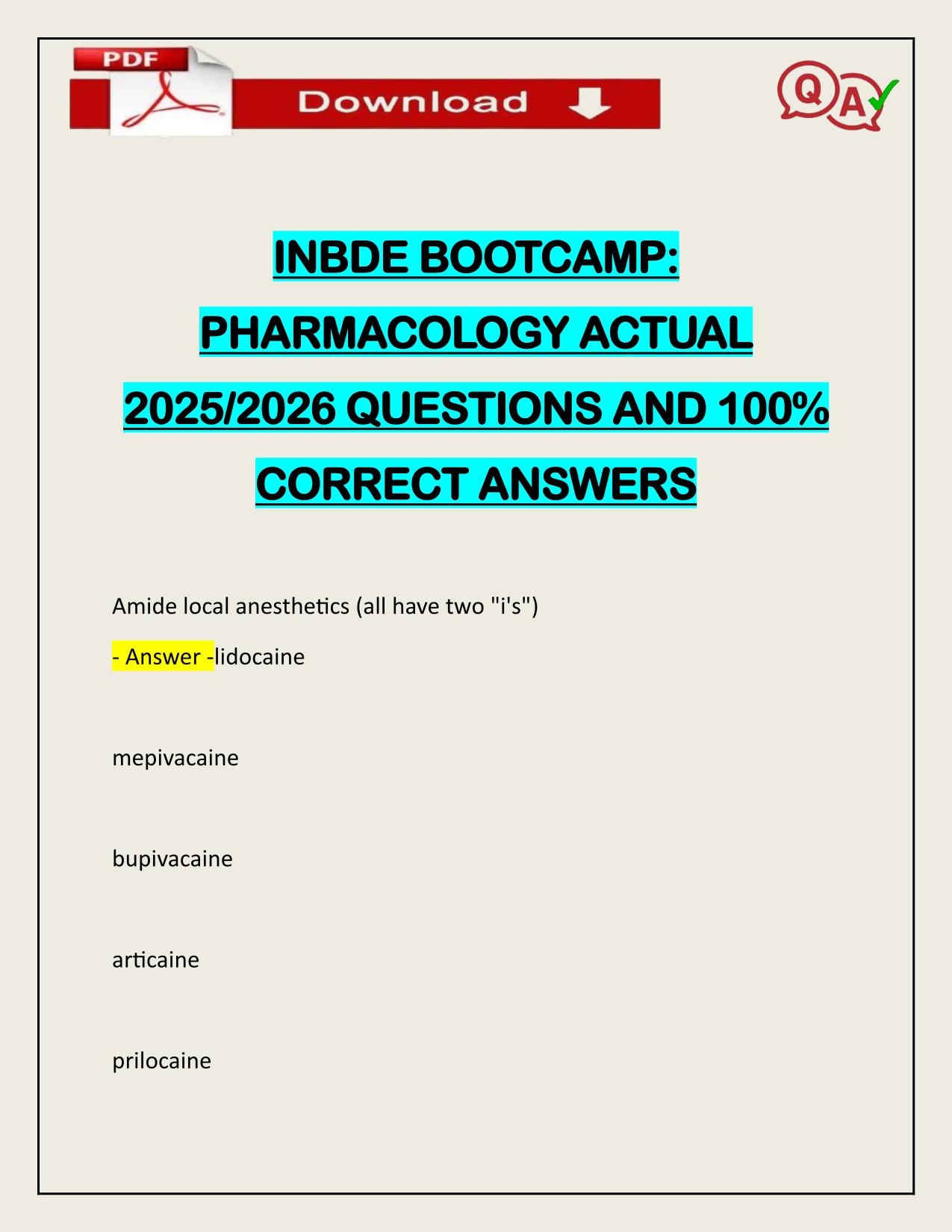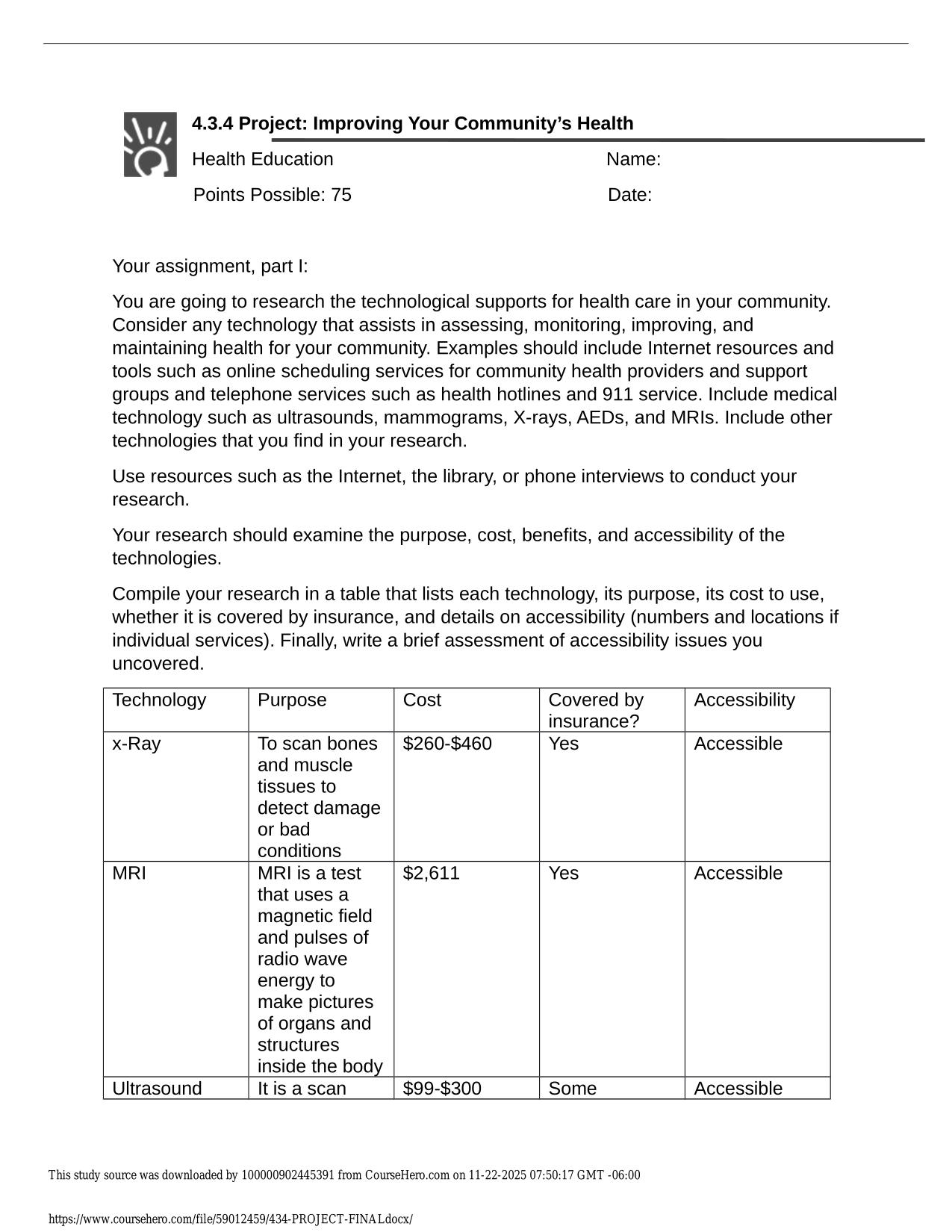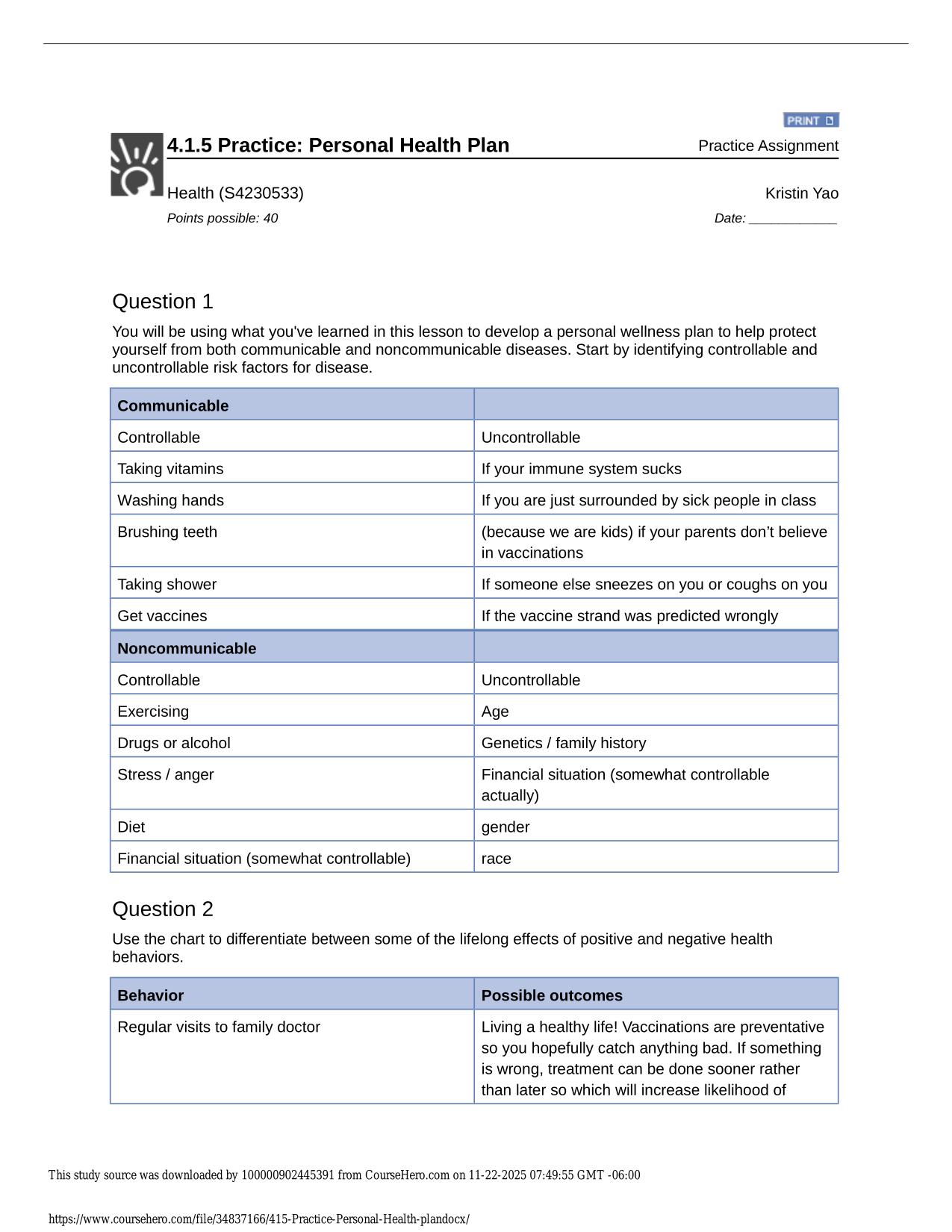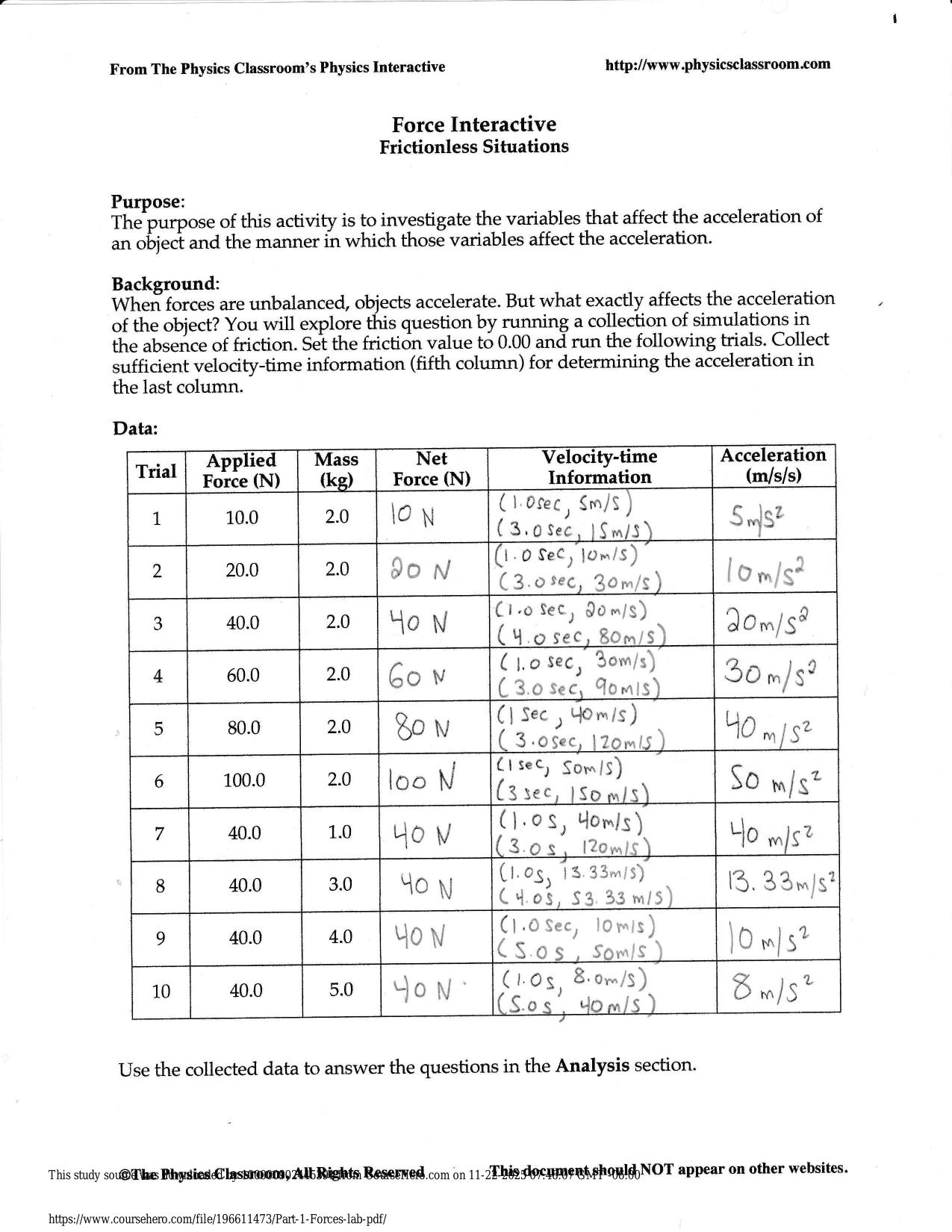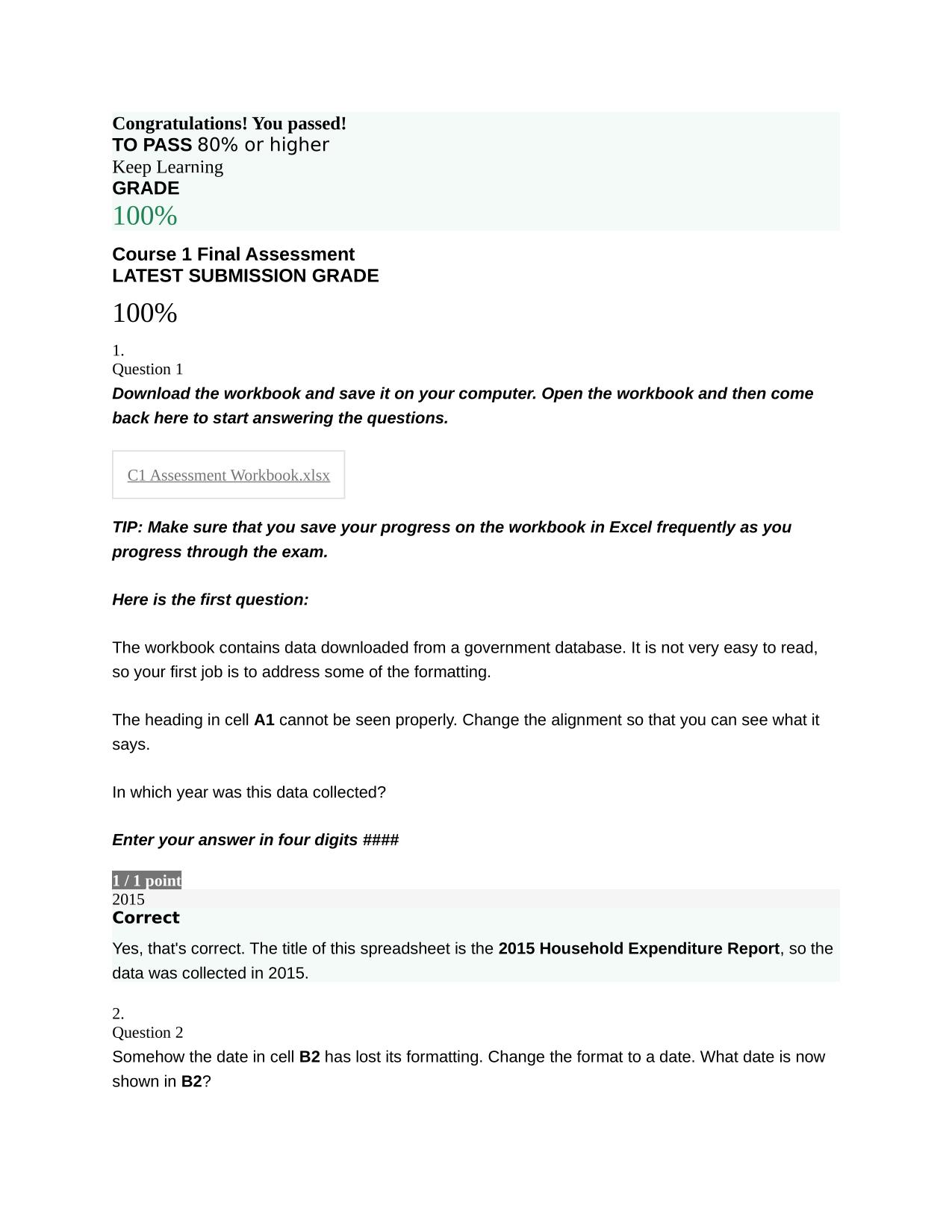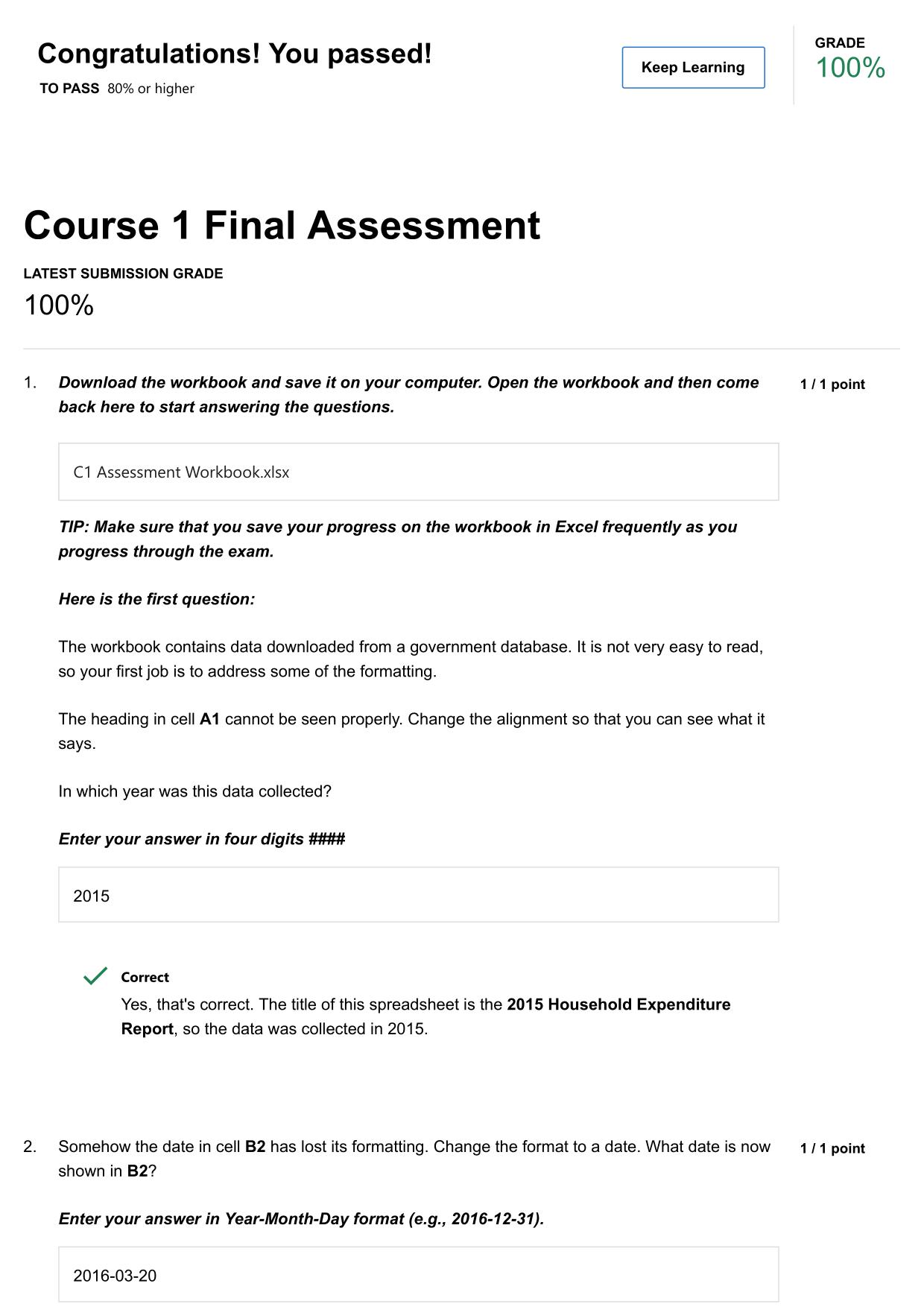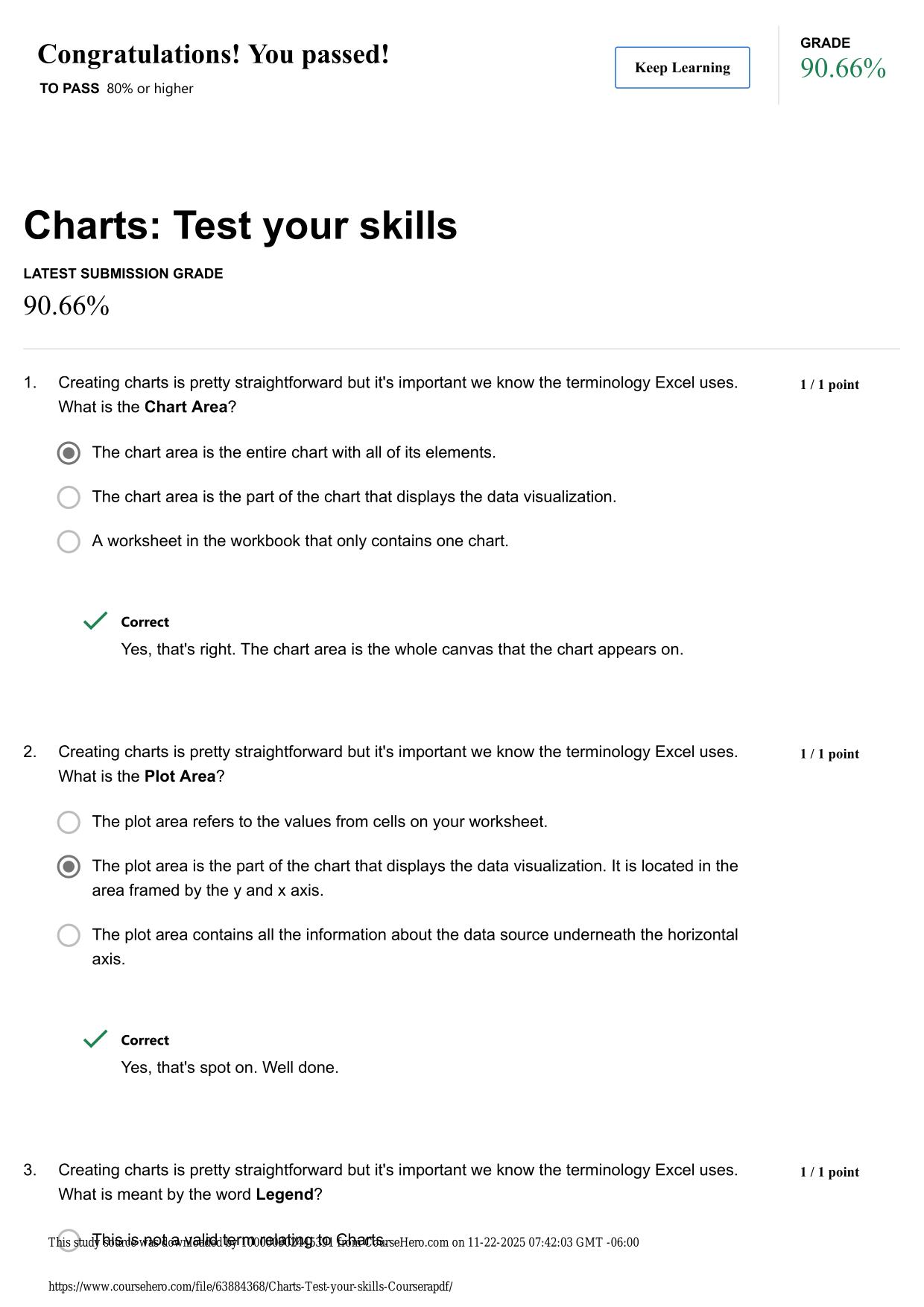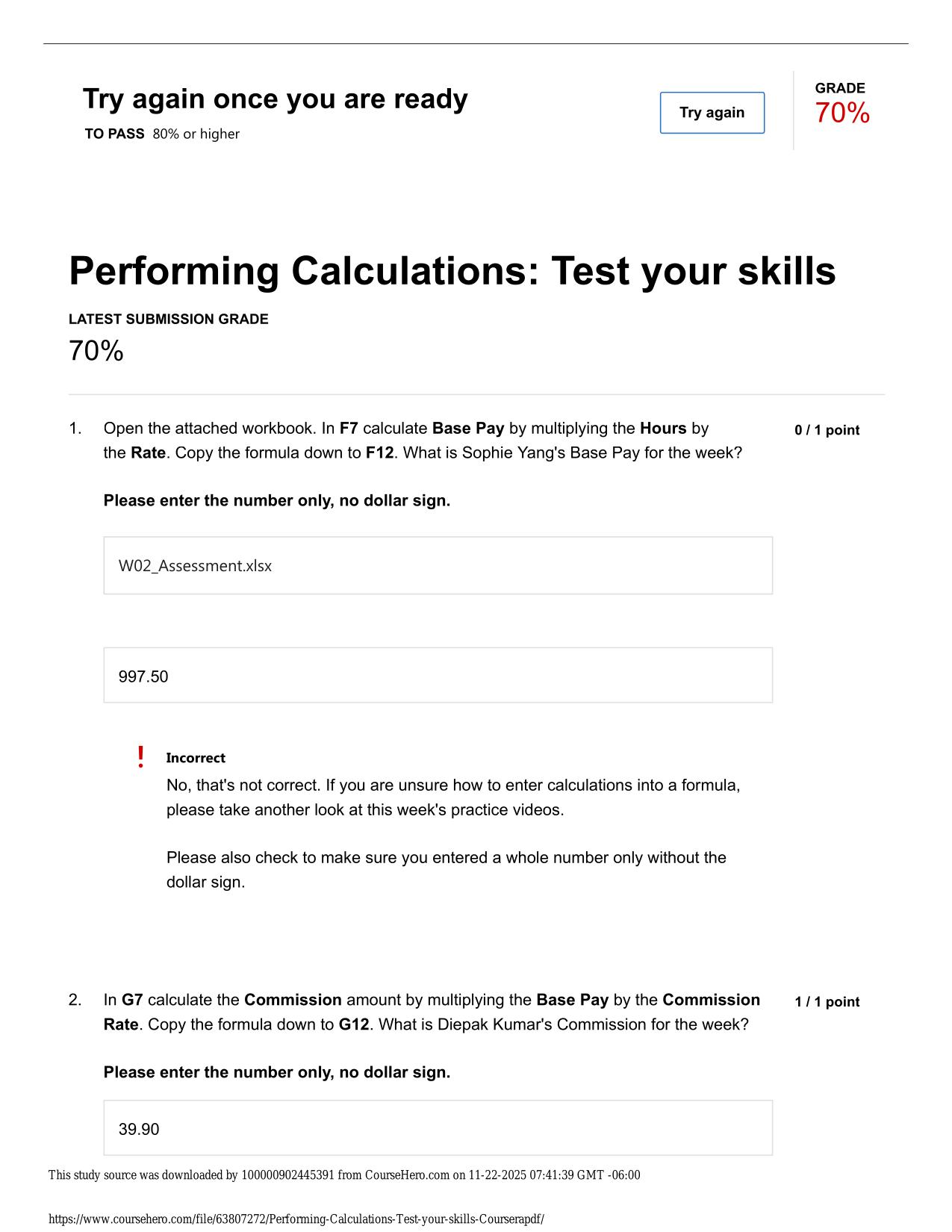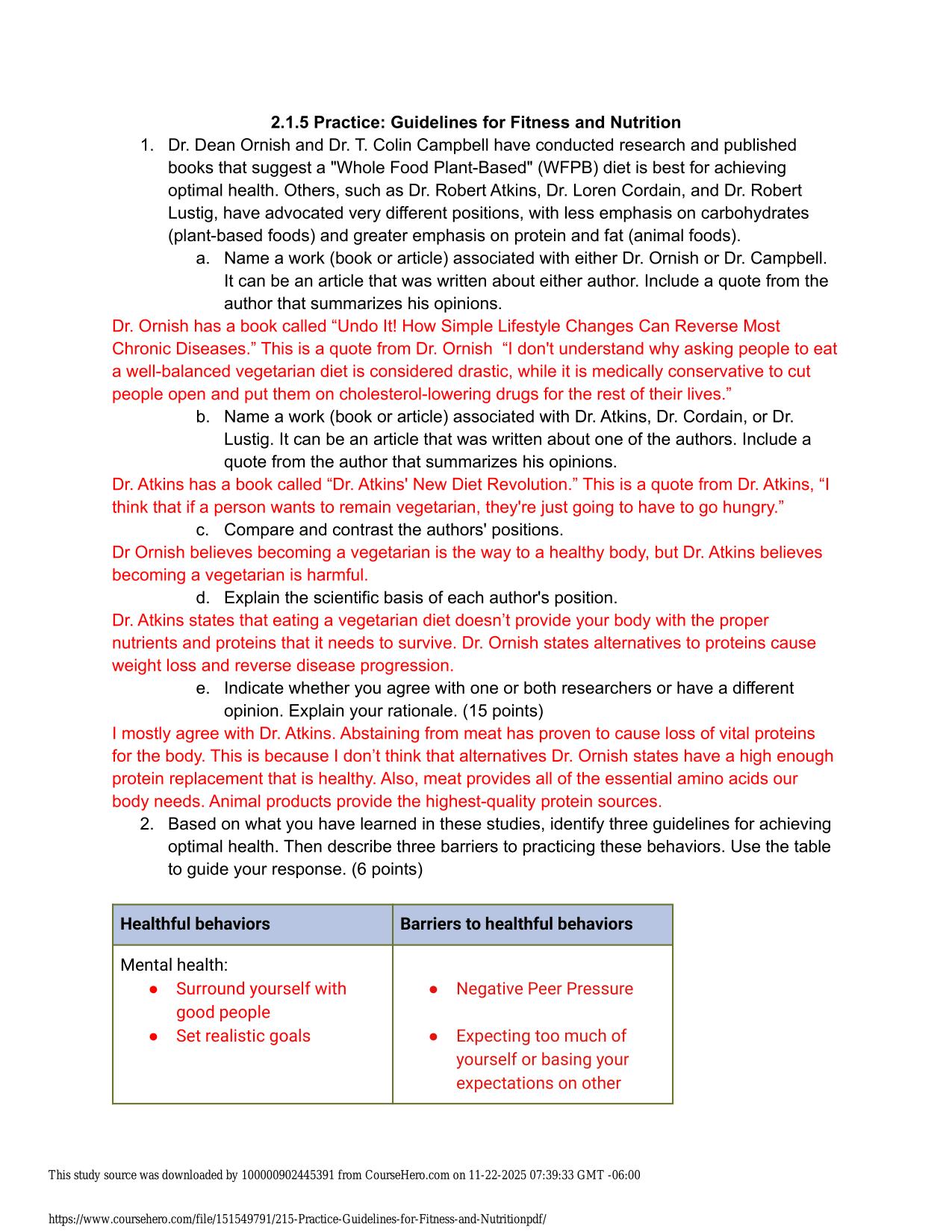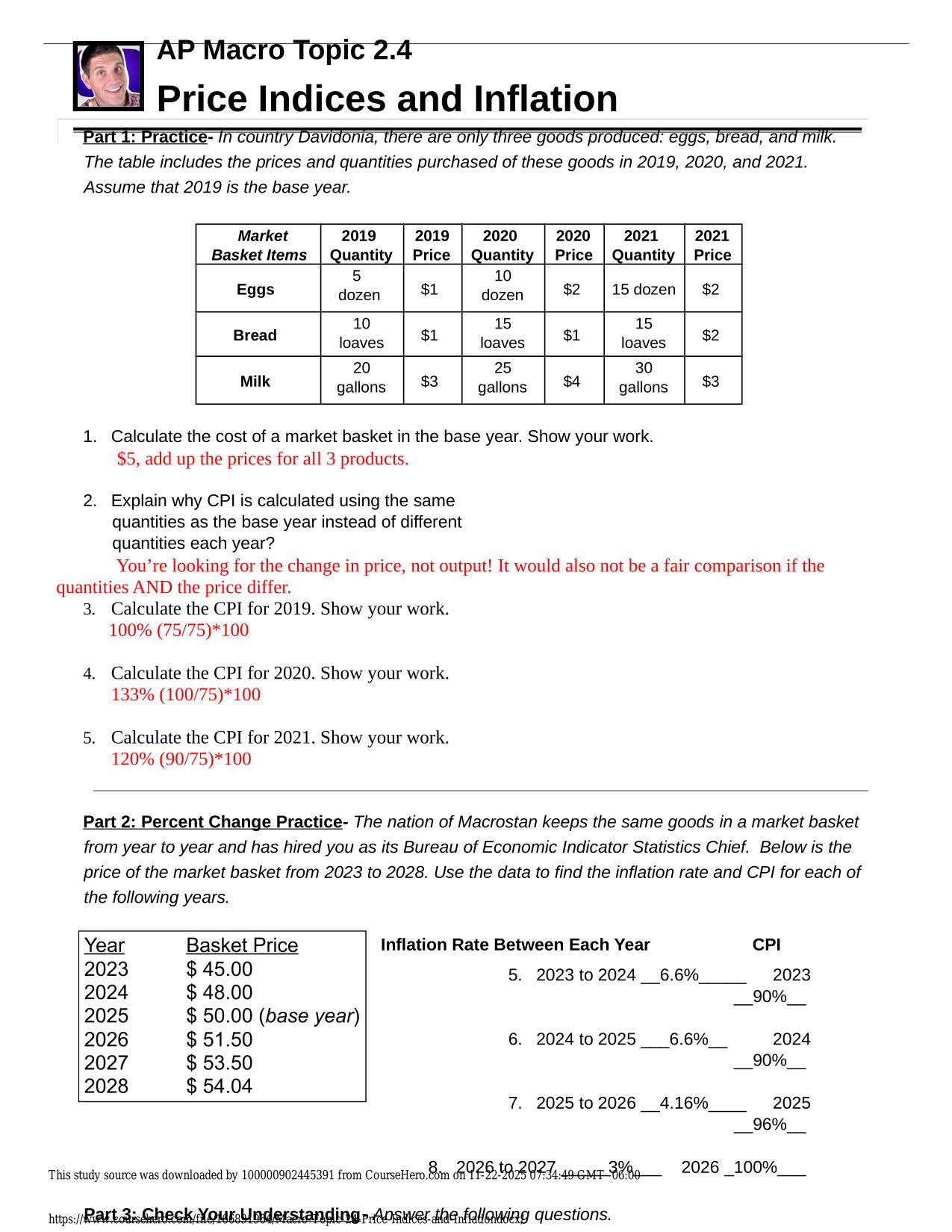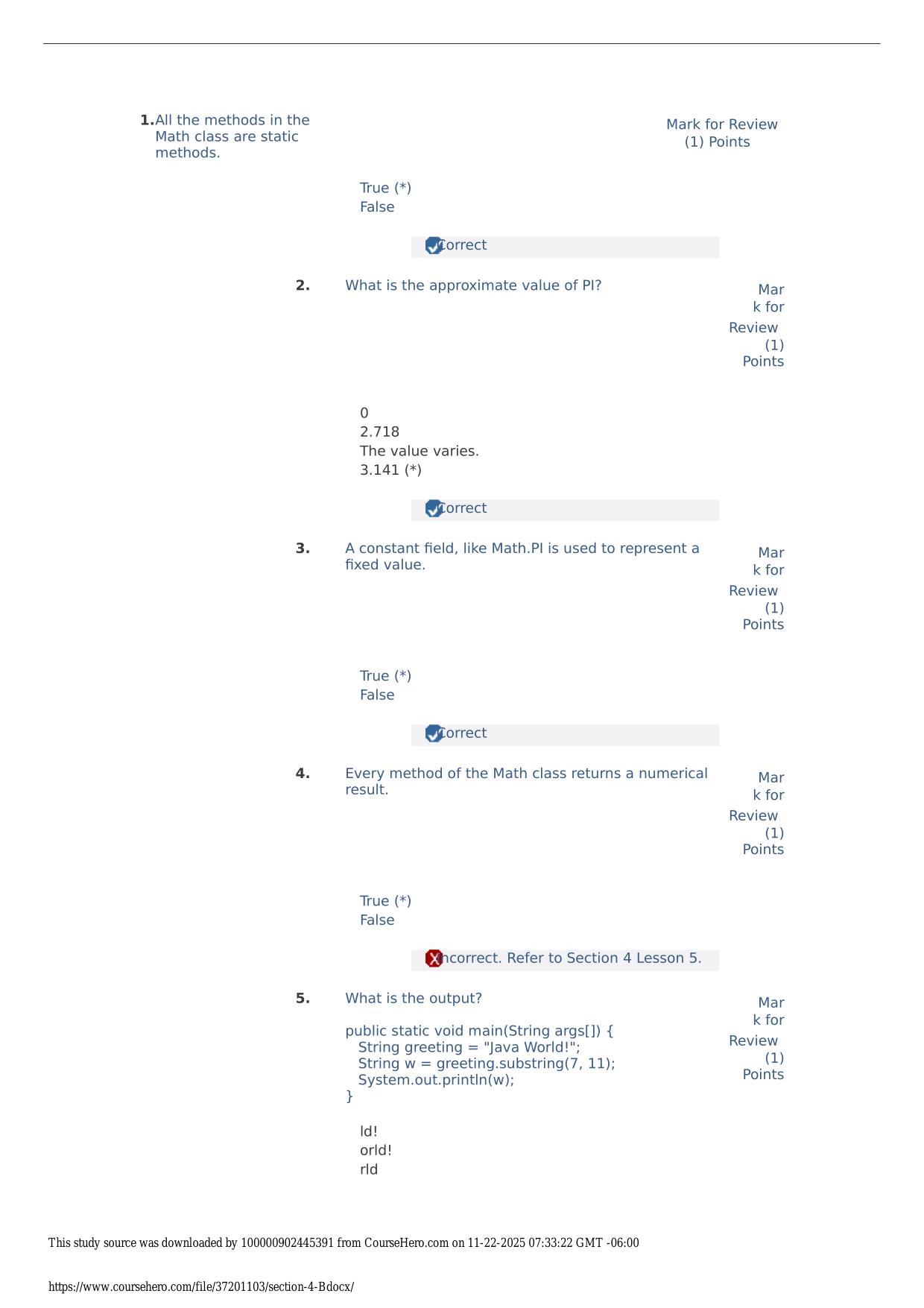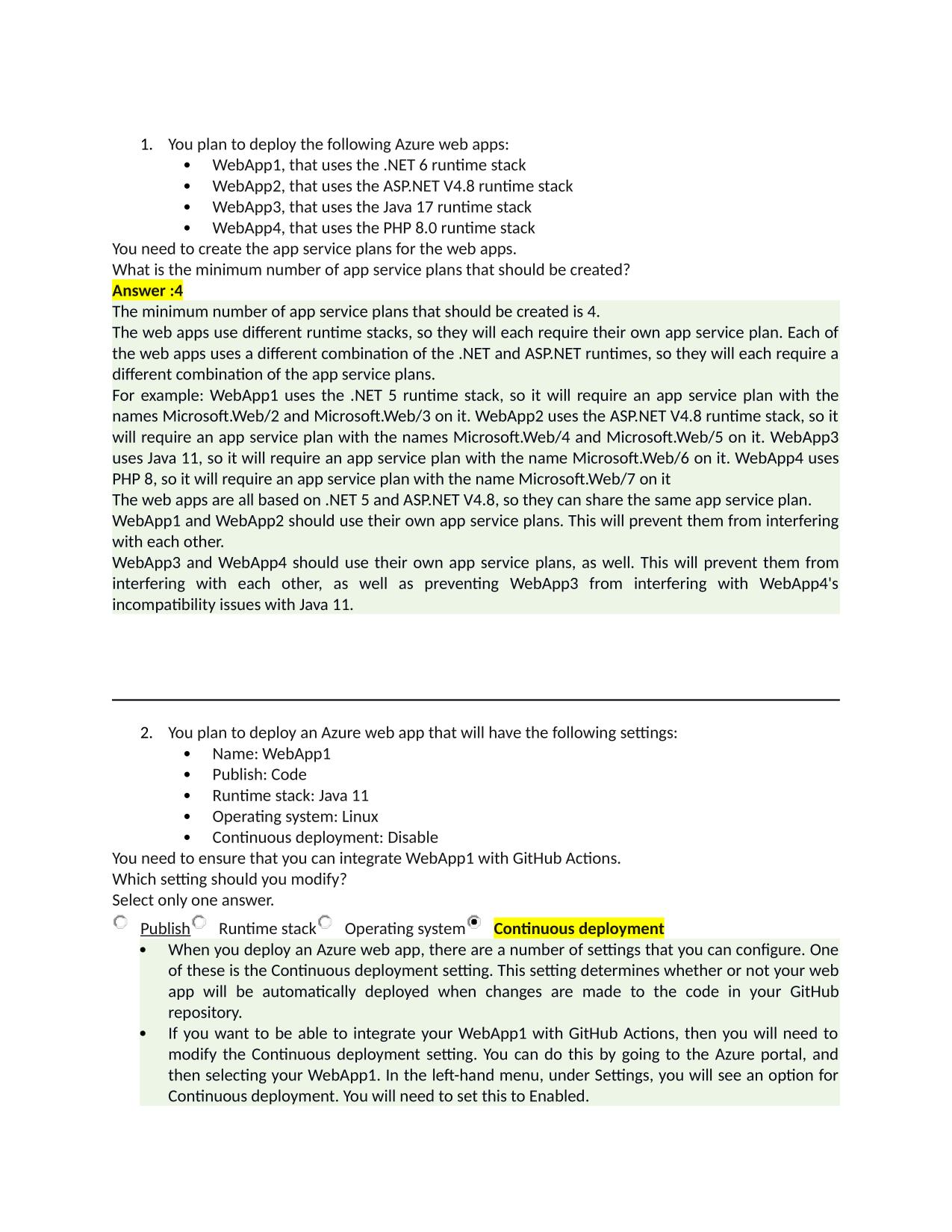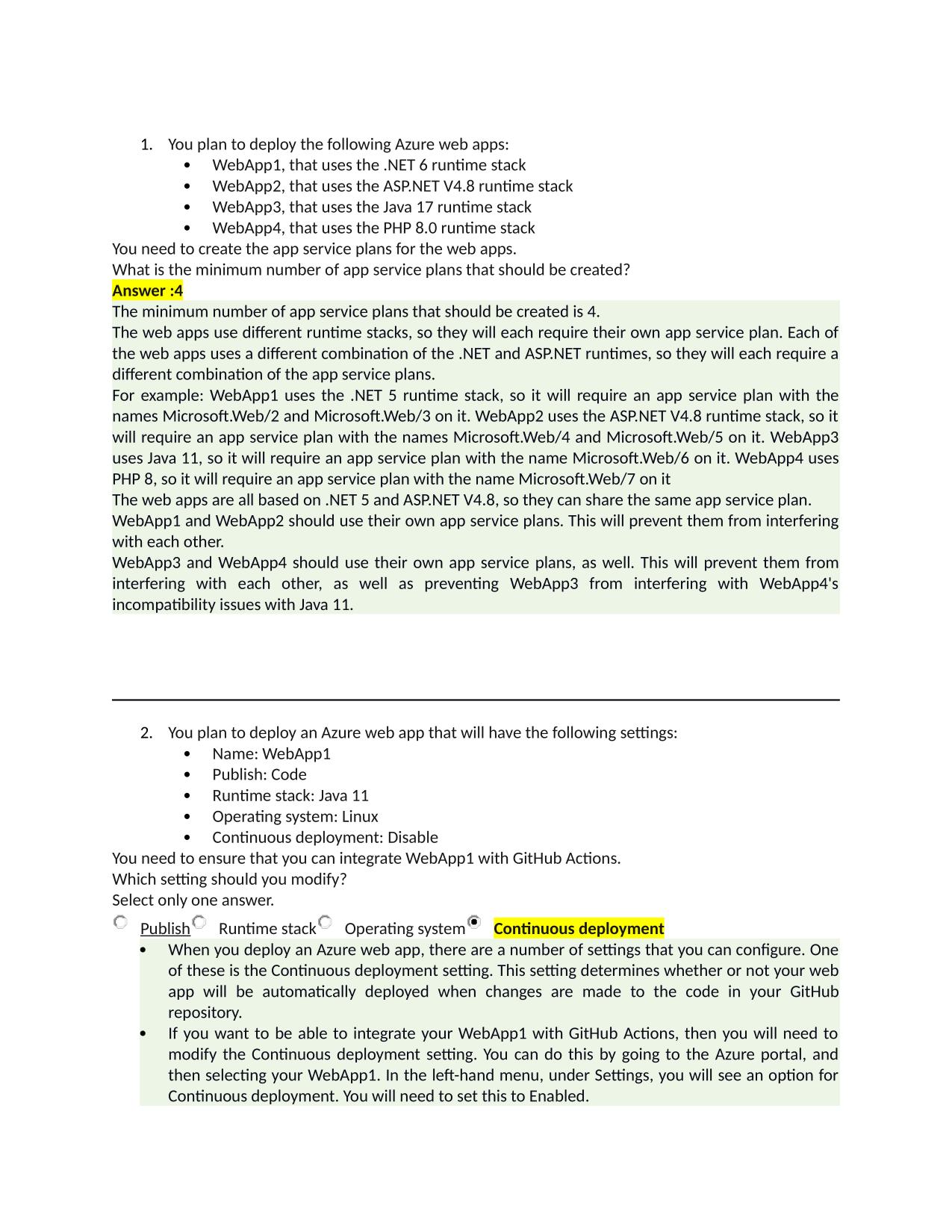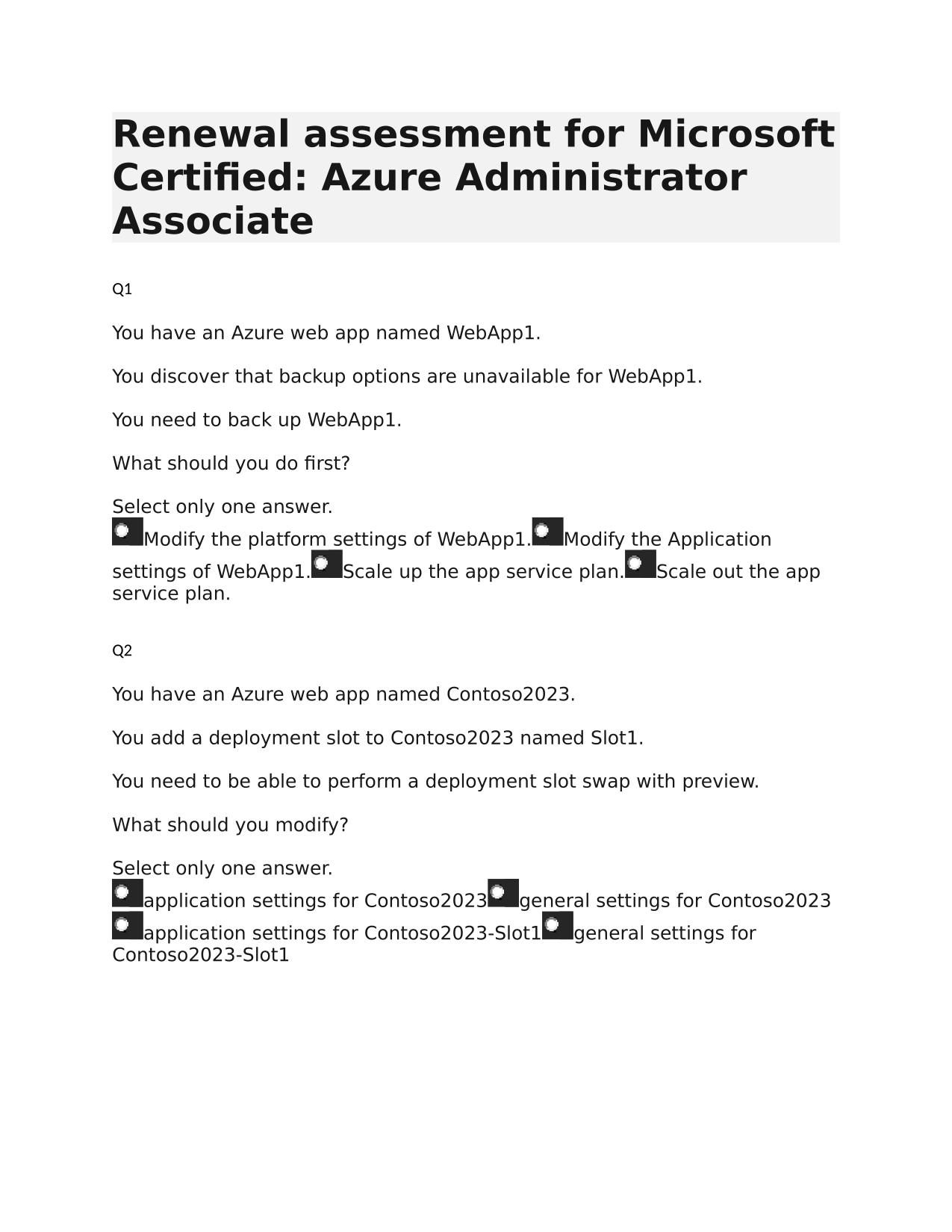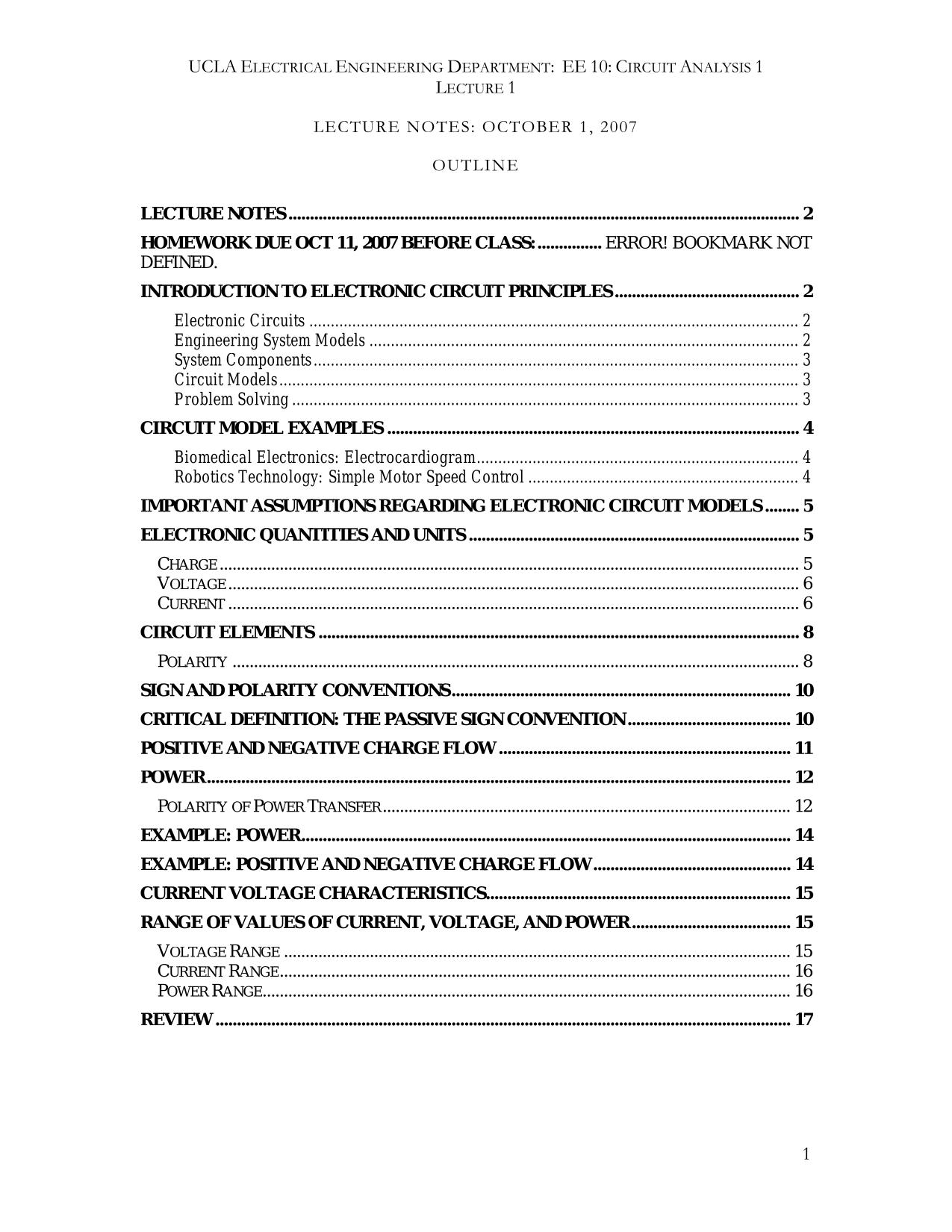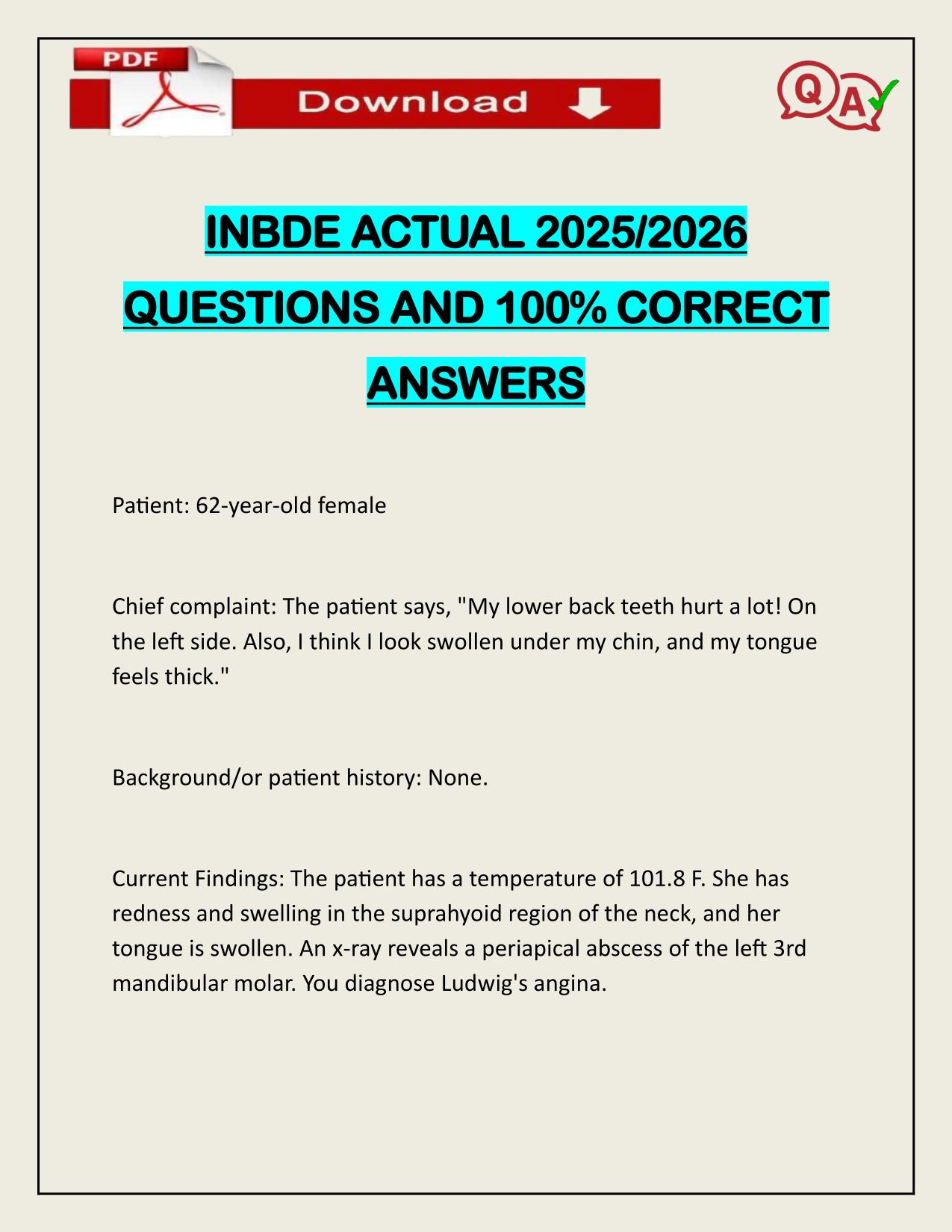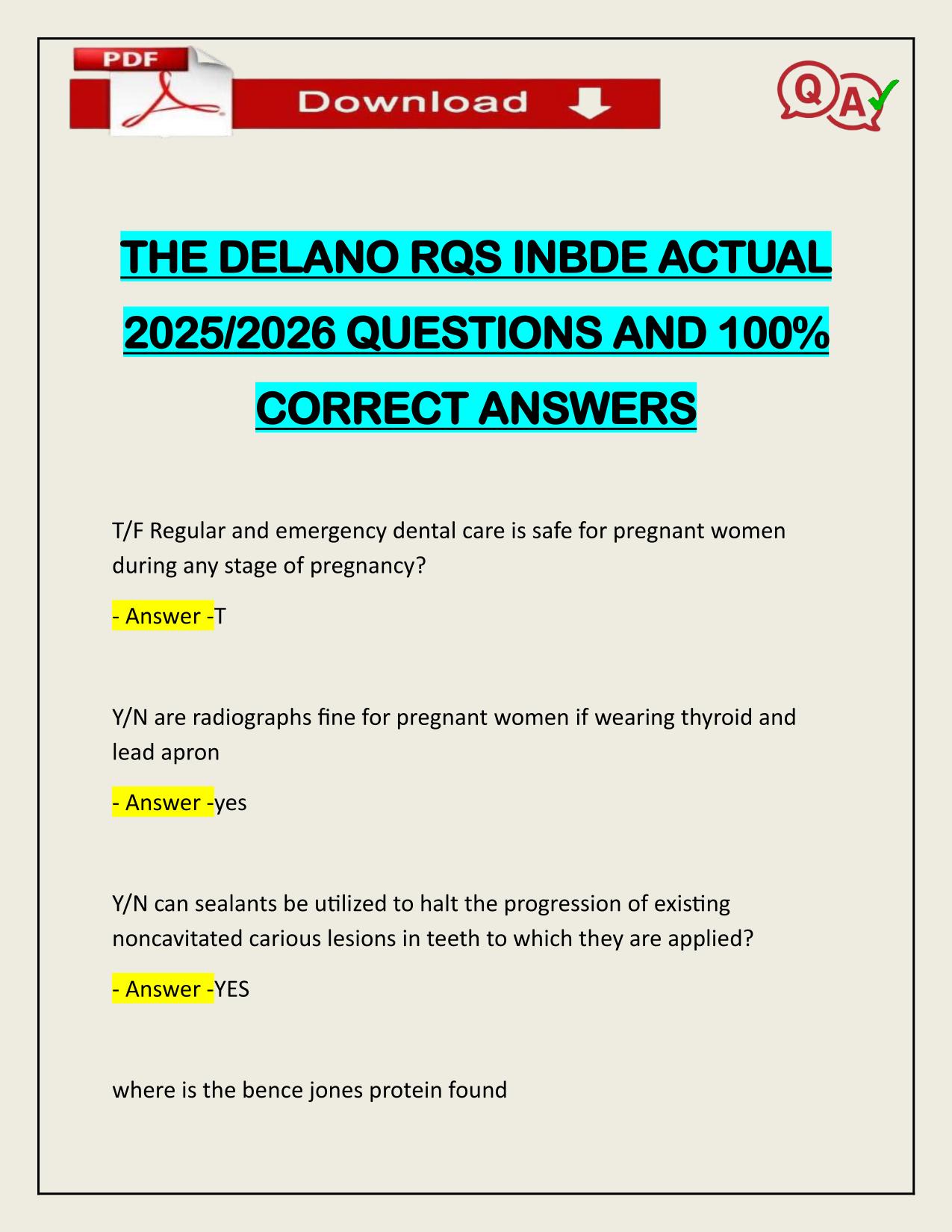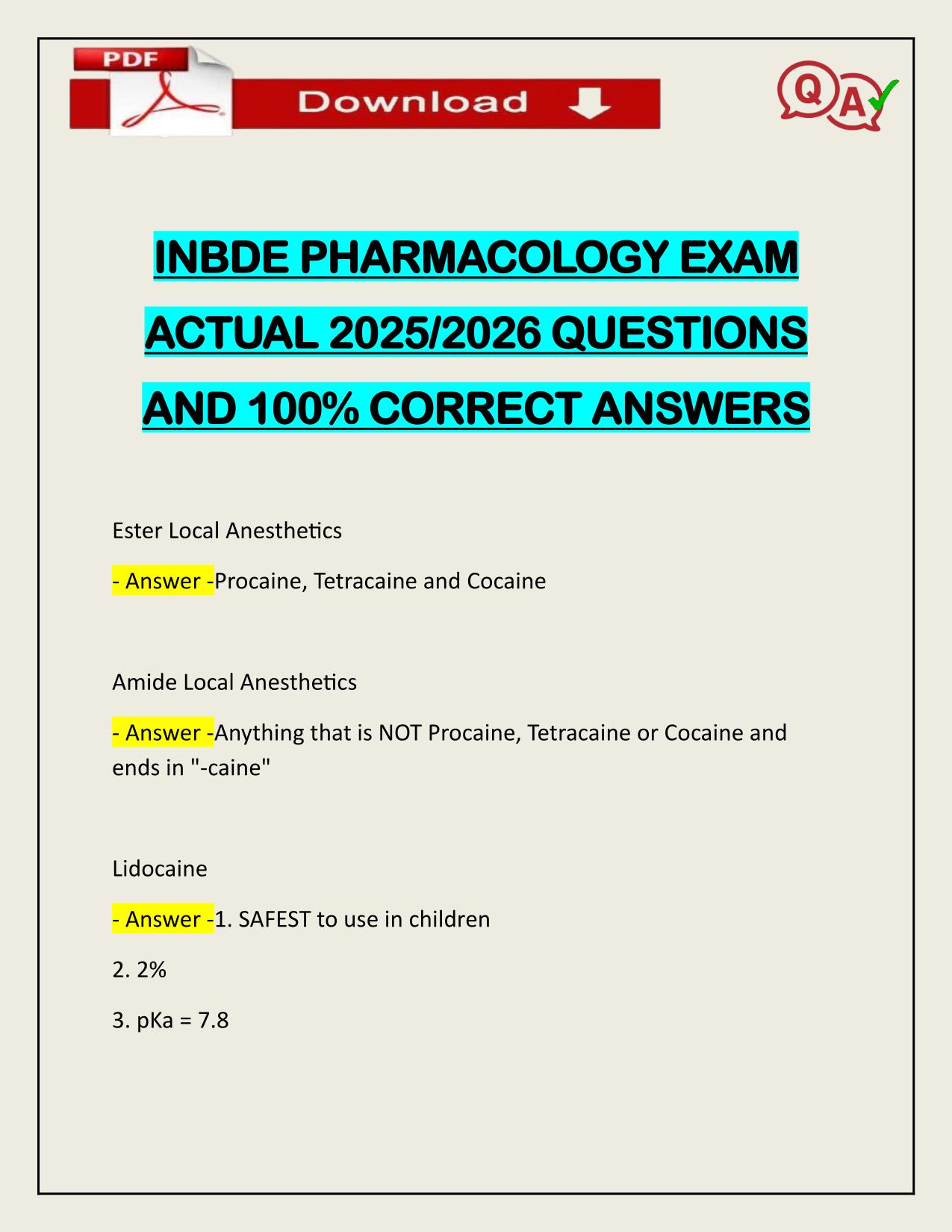INBDE FINAL EXAM ACTUAL 2025/2026 QUESTIONS AND 100% CORRECT ANSWERS
Course:
INBDE
Institution:
INBDE
INBDE FINAL EXAM ACTUAL 2025/2026 QUESTIONS AND 100% CORRECT ANSWERS Patient: 52-year-old white male. Chief complaint: "Suddenly I can't move half my face or close my eye and my ear is ringing! Everything has less taste. My mouth is a little dry." Ba...
After purchase, you get:
✅ Instant PDF Download
✅ Verified answer explanations
✅ Refund if not Satisfied
✅ Prepared for 2025/2026 test cycle
Overview
Each section begins with foundational ideas and gradually introduces more challenging concepts for balanced progression. This building-block approach ensures you have the necessary basics before tackling advanced material. Learners appreciate how each concept naturally flows from what came before, creating a cohesive learning experience. The thoughtful sequencing prevents knowledge gaps that can undermine your assurance and performance.
Who Is This For?
Well-suited to learners who struggle with test anxiety and benefit from predictable, exam-style practice formats. Numerous students have reported feeling calmer during actual exams after using these materials. The familiar format reduces surprises on test day. Suitable for academic programs, tutoring sessions, and exam bootcamps focusing on INBDE and Exam (elaborations) fundamentals. Educators find it saves them preparation time while ensuring quality content. The material adapts well to different teaching environments.
Related Keywords
Detailed Study Description
Frequently Asked Questions
Document Information
| Uploaded on: | October 27, 2025 |
| Last updated: | November 17, 2025 |
| Number of pages: | 75 |
| Written in: | 2025/2026 |
| Type: | Exam (elaborations) |
| Contains: | Questions & Answers |
| Tags: | INBDE FINAL EXAM ACTUAL 2025/2026 QUESTIONS AND 100% CORRECT ANSWERS Patient: 52-year-old white male. Chief complaint: "Suddenly I can't move half my face or close my eye and my ear is ringing! Everything has less taste. My mouth is a little dry." Background/or patient history: Not applicable. Current Findings: Symptoms appeared suddenly. Facial paralysis on the left half of the face, including the forehead. The patient has tenderness posterior to his left ear. Eyes are moist. Which nerve do you suspect has a lesion? A. Facial Nerve (CN VII) B. Glossopharyngeal nerve (CN I |
Seller Information

AdelineJean
User Reviews (0)
Exam (Elaborations)
$10.00
Bundle Deal! Get all 8 docs for just $26.00
Add to Cart
100% satisfaction guarantee
Refund Upon dissatisfaction
Immediately available after purchase
Available in Both online and PDF
$10.00
| 0 sold
Discover More resources
Available in a Bundle
Inside The Document
INBDE FINAL EXAM ACTUAL 2025/2026 QUESTIONS AND 100% CORRECT ANSWERS Patient: 52-year-old white male. Chief complaint: "Suddenly I can't move half my face or close my eye and my ear is ringing! Everything has less taste. My mouth is a little dry." Background/or patient history: Not applicable. Current Findings: Symptoms appeared suddenly. Facial paralysis on the left half of the face, including the forehead. The patient has tenderness posterior to his left ear. Eyes are moist. Which nerve do you suspect has a lesion? A. Facial Nerve (CN VII) B. Glossopharyngeal nerve (CN IX) C. Trigeminal Nerve (CN V) D. Vagus Nerve (CN X) - Answer -A. Facial Nerve The facial nerve innervates the muscles of facial expression and the nerve to stapedius (which dampens sound). Patient: 52-year-old white male. Chief complaint: "Suddenly I can't move half my face or close my eye and my ear is ringing! Everything has less taste. My mouth is a little dry." Background/or patient history: Not applicable. Current Findings: Symptoms appeared suddenly. Facial paralysis on the left half of the face, including the forehead. The patient has tenderness posterior to his left ear. Eyes are moist. The nerve in question exits the skull through: A. the stylomastoid foramen and passes through the parotid gland. B. formen ovale and passes deep to the parotid gland. C. through the external acoustic meatus and passes through the parotid gland. D. the jugular foramen and passes superficial to the parotid gland. - Answer -A. the stylomastoid foramen and passes through the parotid gland. Need assistance on Online classes, Exams & Assignments? Reach out for instant help!! Full Course Assistance, Plagiarism-free Essay Writing, Research Paper, Dissertation, Discussion Posts, etc…. Confidential & Secure services. Tutors are available for all subjects! Email now at: tutorjean01@gmail.com Patient: 52-year-old white male. Chief complaint: "Suddenly I can't move half my face or close my eye and my ear is ringing! Everything has less taste. My mouth is a little dry." Background/or patient history: Not applicable. Current Findings: Symptoms appeared suddenly. Facial paralysis on the left half of the face, including the forehead. The patient has tenderness posterior to his left ear. Eyes are moist. What is the location of the lesion? (Refer to diagram on quiz) A. 1 (proximal to geniculate ganglion, nerve to stapedius, chorda tympani, and branches to muscles of facial expression) B. 2 (distal to geniculate ganglion and proximal to nerve to stapedius, chorda tympani, and branches to muscles of facial expression) C. 3 (distal to geniculate ganglion and nerve to stapedius and proximal to chorda tympani and branches to muscles of facial expression) D. 4 (distal to geniculate ganglion, nerve to stapedius, chorda tympani, and branches to muscles of facial expression) - Answer -B. The lesion is distal to the geniculate ganglion, so the patient has moist eyes, but is proximal to the nerve to stapedius (which dampens sound), the chorda tympani (which consists of taste fibers from the anterior 2/3 of the tongue and parasympathetics to the submandibular ganglion) and branches to the muscles of facial expression. Patient: 52-year-old white male. Chief complaint: "Suddenly I can't move half my face or close my eye and my ear is ringing! Everything has less taste. My mouth is a little dry." Background/or patient history: Not applicable. Current Findings: Symptoms appeared suddenly. Facial paralysis on the left half of the face, including the forehead. The patient has tenderness posterior to his left ear. Eyes are moist. Which nerve is responsible for the patients loss of taste? A. Chorda tympani B. Greater petrosal nerve C. Glossopharyngeal nerve D. Vagus nerve - Answer -A. Chorda tympani Chorda tympani consists of taste fibers to the anterior 2/3 of the tongue and preganglionic parasympathetic fibers to the submandibular and sublingual glands. Need assistance on Online classes, Exams & Assignments? Reach out for instant help!! Full Course Assistance, Plagiarism-free Essay Writing, Research Paper, Dissertation, Discussion Posts, etc…. Confidential & Secure services. Tutors are available for all subjects! Email now at: tutorjean01@gmail.com
CourseHero & Studypool Unlocks
Get Unlocked CourseHero and Studypool documents files instantly to your email, simply by pasting your link and clicking "Unlock Now". Learn more on how to unlock here.
